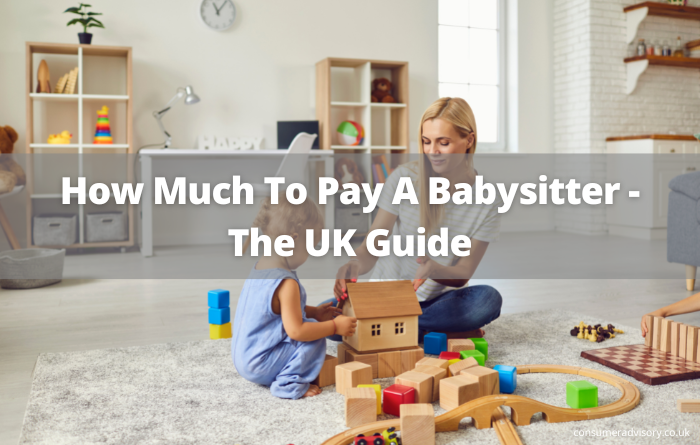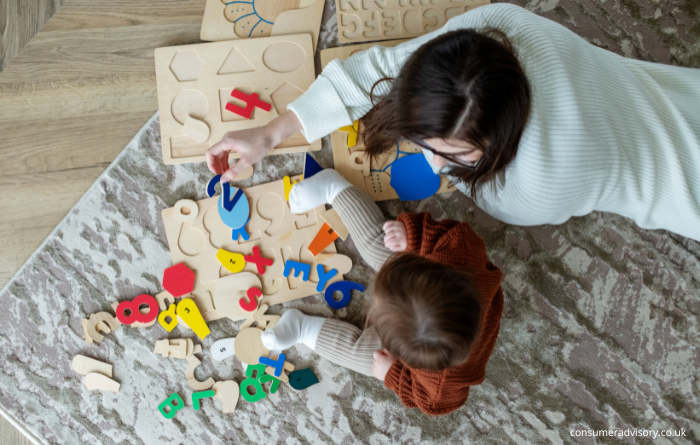
As parents, we all need a break sometimes. Hiring a babysitter is a great way to ensure that your children are cared for while you take some much-needed time out. But how do you know how much to pay a babysitter in the UK?
As a general guide, we’d recommend paying your babysitter at least the National Minimum Wage. This currently stands at £9.50 for adults aged 23 and over.
In this article, we’ll discuss babysitter rates in more detail, as well as giving you some tips on finding the perfect babysitter for your family.
There are a few things that you’ll need to consider when deciding how much to pay your babysitter. These include:
Let’s take a look at each of these in more detail.
The first thing you need to consider when setting a babysitting rate is the age of the babysitter. In the UK, there is no legal minimum age for babysitting, but most parents prefer to hire sitters who are over the age of 16.
You’ll need to take into consideration the minimum wage for the age of the babysitter. Whilst the minimum wage for an under 18 is £4.81, the minimum wage for 18-20 year olds is £6.83, while 21-22 year olds must be paid at least £9.18 per hour. From the age of 23, workers must be paid £9.50 per hour.
Another factor that will affect how much you pay your babysitter is the number of children they’ll be caring for. Generally speaking, the more children there are, the higher the rate will be.
This is because it can be more challenging to care for multiple children, especially if they are of different ages. You’ll need to take into consideration the needs of each child when setting a rate.
The length of time that the babysitter will be needed is also an important factor to consider. If you only need a sitter for a couple of hours, then you won’t need to pay them as much as you would for an all-night shift.
However, it’s worth bearing in mind that most babysitters will charge a minimum fee, regardless of the length of time they are needed. This is to cover their time and effort in travelling to and from your home.
If the babysitter you’re hiring is qualified in childcare, then you may need to offer a higher rate. This is because they will have received training in childcare and first aid, meaning that they will be better equipped to deal with any challenges that may arise.
The time of day or night that the babysitting takes place can also affect the rate. Babysitters are typically more expensive during the evening and overnight, as this is when most parents need childcare.
If you’re looking for a babysitter for a weekend day or weekday evening, then you may be able to find someone who charges a lower rate.
Finally, you’ll need to take into account any special circumstances that may apply. For example, if your child has additional needs, then you’ll need to find a babysitter who is experienced in caring for children with special needs.
You may also need to pay a higher rate if you require the babysitter to do any additional tasks, such as cooking meals or driving the children to and from activities.
Whilst there is no set price for babysitting in the UK, the average rate is £10 per hour. However, this will vary depending on the factors discussed above.
To get an accurate quote, it’s best to contact a few different babysitters in your area and ask for their rates. You can then compare prices and choose the babysitter that fits with your budget, as well as being right for your family.
Now that you know how to set a babysitting rate, it’s time to start looking for a sitter. This is not always an easy task. After all, there is nothing more important than your children, so you need to be sure that the babysitter you choose is trustworthy and reliable.
Here are a few tips to help you find the perfect babysitter:
The best way to find a good babysitter is to ask around for recommendations from people you trust. Your friends and family will be able to give you first-hand accounts of their experiences with sitters in your area.
If your child attends school or nursery, it’s worth asking whether any members of staff offer babysitting services in their spare time. Childcare staff need to hold DBS checks, as well as being first aid trained, so you can rest assured that your child will be in safe hands.
There are a number of online services that can help you find a babysitter in your area. These websites allow you to search for sitters based on their location, availability, and qualifications. You’ll also be able to see whether they hold a DBS certificate, which will give you peace of mind.
Once you’ve found a few potential babysitters, it’s important to check their references. This will help you to get an idea of their experience and whether they are reliable and trustworthy.
Finally, it’s a good idea to interview the babysitters that you’re considering hiring. This will give you an opportunity to ask them any questions that you may have and to get to know them a little better. It’s also a good way to see whether they are good with children.

In the UK, there is no legal age for babysitting. However, most parents prefer to hire babysitters who are at least 16 years old. This is because 16 is generally considered to be the age at which young people are able to take on responsibility.
Of course, it’s not just a matter of age. The maturity level of the babysitter is also important. Some 14-year-olds may be more responsible than some 18-year-olds, so it’s important to get to know the person you’re considering hiring before making a decision.
There is no legal minimum age for babysitting in the UK, but it’s important to make sure that the person you’re leaving your child with is responsible and capable of looking after them. This means ensuring that they know what to do in an emergency, not only to keep themselves safe, but so that they can keep the younger children safe too.
It’s unlikely that a 13 year old would have the emotional maturity to be left responsible for a younger child. This is because they may panic if there is an emergency and make the wrong choice.
If you do decide to allow a 13 year old to babysit, it’s important to make sure that you leave clear instructions and that they know how to contact you if they need to. You should also check in on them regularly to make sure that everything is going okay.
The law does not give a specific age at which it is legal to leave a child home alone. However, according to the NSPCC, children under the age of 12 should not be left home alone for long periods of time and they should never be left overnight.
For children under the age of 16, the NSPCC recommends that you consider their maturity and ability to cope before leaving them home alone. This means taking into account factors such as their confidence, ability to follow instructions, and whether they are likely to panic in an emergency.
A babysitter is someone who looks after your children for a short period of time, usually in the evenings or overnight. A nanny is someone who looks after your children on a more full-time basis, and they often live with you.
Nannies are usually qualified childcare professionals, whereas babysitters tend to be offering their services as a sideline to supplement their income. Nannies usually have more experience than babysitters, but this is not always the case.
Both babysitters and nannies can provide a high standard of care for your children, but it’s important to choose the right person for the job. If you’re looking for someone to look after your children on a regular basis, then a nanny may be a better option. However, if you just need someone for the occasional night out, then a babysitter may be more suitable.

In the UK, there is no legal requirement for babysitters to be registered, providing they are caring for children in the child’s home, rather than their own home. However, many parents prefer to hire babysitters who are registered with a professional body such as the British Nanny Association or the National Childminding Association.
These organisations provide training and support for their members, so you can be sure that your babysitter will be well-qualified to look after your children.
There is no legal requirement for a babysitter to have a contract, but it’s always a good idea to draw one up. This will protect both you and the babysitter, and it will help to avoid any misunderstandings about the job.
A contract should include details such as the hourly rate, the days and times that the babysitter will be working, and any other relevant information. It’s also a good idea to include a section on what to do in an emergency, so that both you and the babysitter are clear on the procedure.
There is no legal limit on the number of children that a babysitter can look after, but most professional organisations recommend that a babysitter should not be responsible for more than four children at a time.
This is because it can be difficult to give each child the attention they need when there are more than four of them. However, this depends on the ages of the children, as well as any special needs that they may have.
Babysitting is classed as self employed work. This means that the babysitter should register as self employed, completing an annual self assessment tax return to determine the amount of tax that they are liable to pay.
Paying a babysitter is something that all parents need to consider at some point. There are a few things to bear in mind, such as the age of the children, the experience of the babysitter, and whether you need a contract. However, as long as you do your research, you should be able to find a great babysitter who will provide excellent care for your children.
In this article, we have explained how much to pay a babysitter in the UK, as well as answering some of the most commonly asked questions about hiring a babysitter.
Copyright © 2025 Consumer Advisory. All rights reserved.